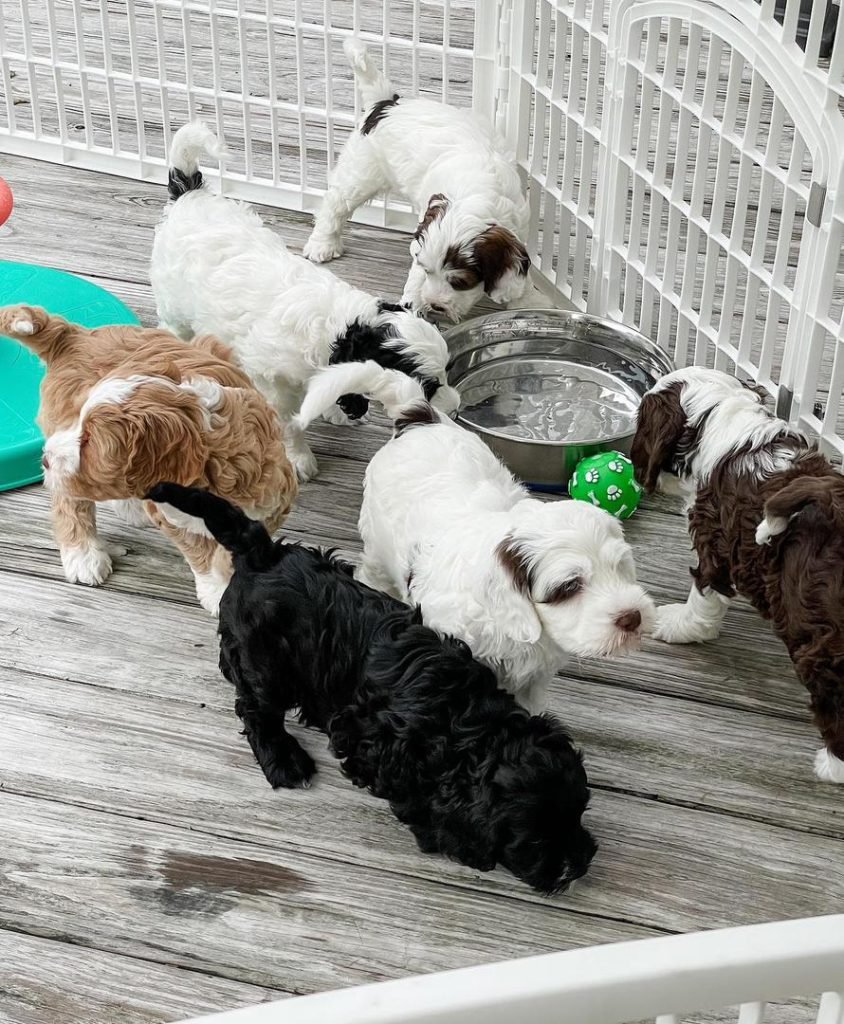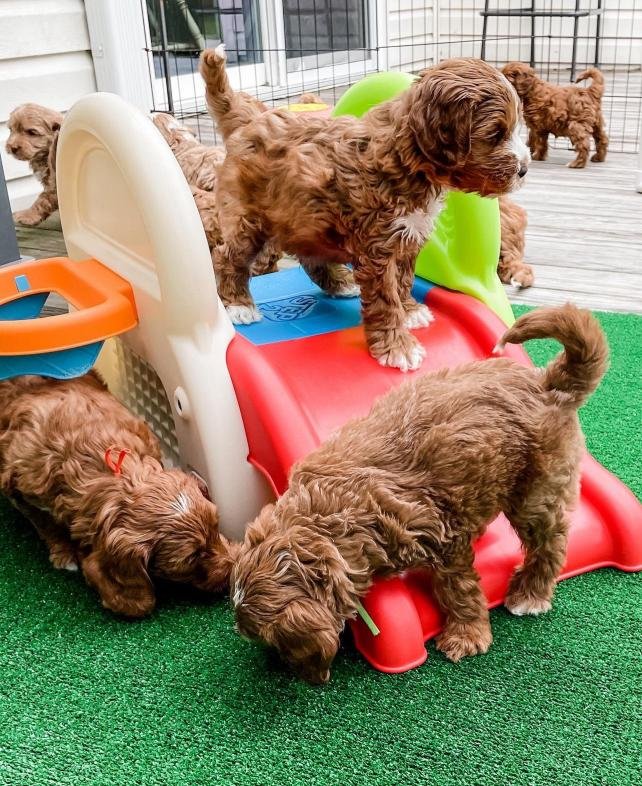Labradoodle History
Labradoodles For Adoption History
Labradoodles For Adoption History
Labradoodles are designer dogs, which means they’re crossbreeds, sired by two thoroughbred parents: a poodle and Labrador retriever. They’re a relatively young breed of dog, with a kind and loving nature and tons of energy. Their adorable curly fur and expressive faces make you want to cuddle them — and these little guys love nothing more than a good squish. All this and more makes our labradoodle puppies for sale one the most in-demand in our center.
Children, other dogs and even cats are all friends with Doodles, provided they’re socialized early and trained well. When it comes to teaching them good behavior and tricks, they’re easy to train and love learning. Activity-loving families adore these dogs for their propensity towards sports, and anyone who prefers low-shedding pooch benefits from their wooly or fleecy fur. Labradoodle puppies for sale are so cute and come in such a wide range of colors that it makes choosing your new best friend super-hard! (Labradoodles For Adoption History).
The Labradoodle is an Australian dog breed, first introduced by breeder Wally Conron in 1989. While spearheading the Royal Guide Dogs Association of Australia breeding program, he conducted the crossbreeding of a standard poodle and Labrador retriever in view of it being a hypoallergenic guide dog for blind people. The first example of this type of dog, called Sultan, went to live with a lady in Hawaii, where other breeders saw him as an inspiration and this is how Australian Labradoodle puppies started. (Labradoodles For Adoption History).
Both the International Australian Labradoodles Association and the Australian Labradoodles Association of America are working hard to incorporate more intergenerational breeding so these dog breeders can register this type of dog as a purebred dog. Its gentle, obedient and intelligent personality combined with a hypoallergenic coat make it ideal for family members with allergies, but it also makes an excellent service or therapy dog. (Labradoodles For Adoption History)
Temperament
While Labradoodle breeders originally bred the Australian Labradoodles as therapy dogs, their fun, friendly personalities made them popular pets. Now you can find these sociable dogs in homes across the globe. Here are some of the top personality traits of our Labradoodle puppies for sale. (Labradoodles For Adoption History)
Playfulness
If there’s one thing Labradoodle breeders and owners can agree on, it’s that this dog breed loves to play. They tend to do best in active households where they can work off all that pent-up energy. You can fulfill their needs through the following activities: (Labradoodles For Adoption History).
- Walks or jogs: Labradoodles make great walking companions and can even keep up with you during a jog.
- Playing in the yard: Enjoy a game of fetch with your furry friend in the yard or just let it loose on its own.
- Dog sports: If you stay active through sports, consider making your labradoodle a part of your routine. Bring it on bike rides, go for a run together or kick a ball around in the yard.
- Obstacle courses: Set up an obstacle course for your dog using household items.
- Scavenger hunt: Creating a scavenger hunt for your canine is a great way to exercise its body and brain.
In general, Labradoodles need anywhere from 30 to 60 minutes of exercise a day. You can also enroll them later at a Labradoodle puppy alumni school for proper training. (Labradoodles For Adoption History).
Friendliness
What makes Labradoodles the perfect puppy compare to other dog breeds is their ability to get along with just about anyone. They inherit this trait from their Labrador retriever parent, a breed also known for its outgoing nature. You can trust your labradoodle to form friendships with everyone, from children and older adults to strangers and other puppies. (Labradoodles For Adoption History).
Thanks to their affectionate, sociable personalities, Labradoodles make great pets for first-time owners, families, or anyone looking for a companion. However, keep in mind that Labradoodles can become overexcited, so it’s a good idea to supervise them with children. (Labradoodles For Adoption History)
Intelligence
Thanks to their poodle parent breeds, Labradoodles are incredibly intelligent dogs. Their ability to quickly learn and understand commands makes them easy to train — it’s also why Labradoodles are a popular choice for therapy. Because Labradoodles are intelligent, they often crave mental stimulation. To help ensure your pet’s needs are being met, you should do the following:
- Provide stimulating toys (like puzzles or chew toys)
- Play games that require thinking (like scavenger hunts or hide and seek)
- Set up puppy play dates where your pet can interact with other puppies
You can also stimulate your pet’s mind by teaching it new tricks.
Puppies Grooming
Our Labradoodle puppies for sale have a variety of coat textures that dog owners enjoy, but in general, their low shedding coat needs brushing at least twice a week. Not only does this keep them tangle-free but it also removes excess debris from their coat, keeping them fresh and hygienic. Regularly trim the hair around their eyes and in between their paws to prevent these problem areas from causing irritation. (Labradoodles For Adoption History).
Pooches with fleece coats tend to have longer fur and benefit the most from going to a professional groomer — although every dog loves getting pampered once in a while.
Feeding
When you get your new pup, it’ll already be on a feeding schedule. It’s important that you stick to it as closely as possible, using the same food. At Pride and Prejudoodles, we send a can and a bag of the foods we use for free with your hand-delivered bundle of joy. If you need to change it for any reason, it must be done gradually to avoid stomach upsets. In case it does experience problems, it’s best to revert to the original diet and consult with a vet about making any changes.
Older dogs won’t necessarily have a problem with switching food because it’s rare they’ll be fussy about food. As their pet parent, it’s up to you to decide how much to invest in the diet. Just bear in mind that a diet is such a crucial aspect of wellness that feeding them good quality food will add years to their lives compared to opting for low-quality feed.

